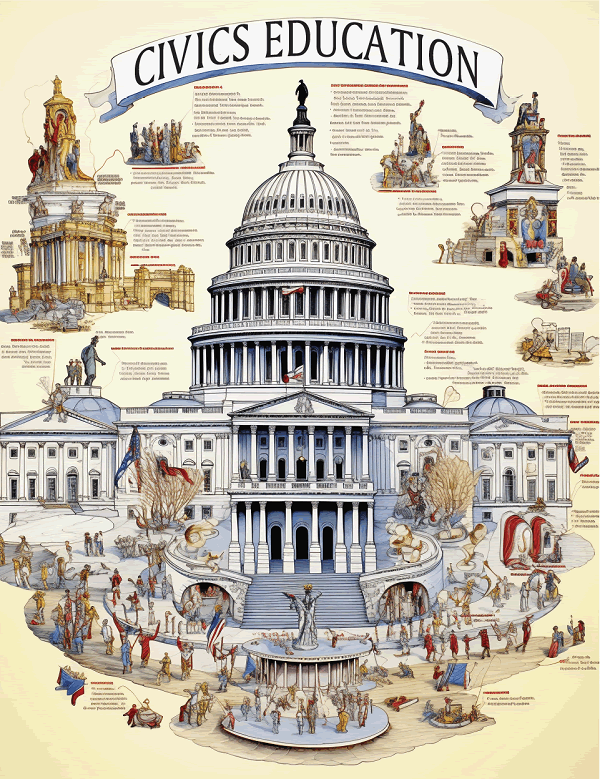Studying civics and understanding the workings of American government are critically important for students today for several reasons.
Civics education helps students understand their civic duties and responsibilities as citizens of a democratic society. It empowers them to actively participate in the democratic process, such as voting, serving on juries, and engaging in community service.
 An understanding of government and civics equips students with the knowledge they need to make informed decisions as voters. In an era of complex policy issues, informed citizens can evaluate political candidates and policies more effectively.
An understanding of government and civics equips students with the knowledge they need to make informed decisions as voters. In an era of complex policy issues, informed citizens can evaluate political candidates and policies more effectively.
Civics education encourages critical thinking and the ability to analyze complex issues from multiple perspectives. It teaches students to evaluate evidence, assess arguments, and arrive at reasoned conclusions--a skill set crucial for active citizenship.
A strong civics education instills respect for the democratic principles and institutions that underpin American society. This respect is essential for the preservation and continuation of democratic norms and values.
Civics education promotes engagement in political and social issues. It encourages students to become involved in their communities, advocate for change, and address pressing problems, fostering a sense of agency and responsibility.
An understanding of government and civics facilitates productive civic discourse and debate. It encourages civil and respectful discussions about differing political opinions, fostering a culture of dialogue and compromise.
Civics education helps students appreciate their individual rights and the limitations of those rights in a democratic society. It emphasizes that rights come with corresponding responsibilities.
Civics education exposes students to pressing social and political issues, such as civil rights, immigration, healthcare, and the environment. This awareness fosters empathy and a desire to address societal challenges.
Civics education nurtures future leaders by providing them with a foundational understanding of government processes and institutions. It encourages students to consider careers in public service.
Civics education emphasizes the importance of civic virtue, including principles like honesty, integrity, and public service. These values are crucial for ethical and responsible citizenship.
Civics education teaches students about the fragility of democracy and the historical examples of democratic erosion. This knowledge reinforces the importance of vigilance and active participation in safeguarding democratic institutions.
Understanding American government and civics also helps students appreciate the United States' role in the global community. It fosters an understanding of international relations, diplomacy, and global issues.
Civics education equips students to address contemporary challenges, such as disinformation, fake news, and political polarization. It teaches media literacy and critical evaluation of information sources.
Civics education is essential for cultivating responsible, engaged, and informed citizens who actively participate in the democratic process and work toward the betterment of society. In a rapidly changing and complex world, an understanding of government and civics is an invaluable tool for navigating civic life and contributing to a thriving democracy.
We are delighted to assist teachers and students on this learning journey with our assortment of free printable worksheets, workbooks, and more. |
 An understanding of government and civics equips students with the knowledge they need to make informed decisions as voters. In an era of complex policy issues, informed citizens can evaluate political candidates and policies more effectively.
An understanding of government and civics equips students with the knowledge they need to make informed decisions as voters. In an era of complex policy issues, informed citizens can evaluate political candidates and policies more effectively.






